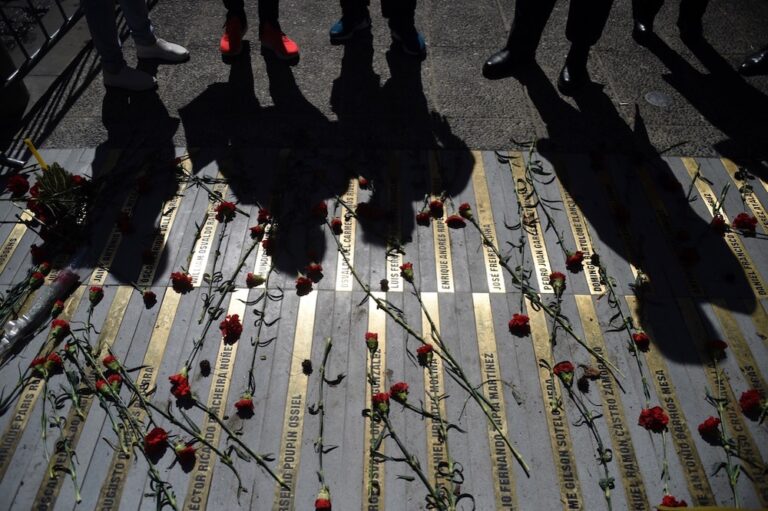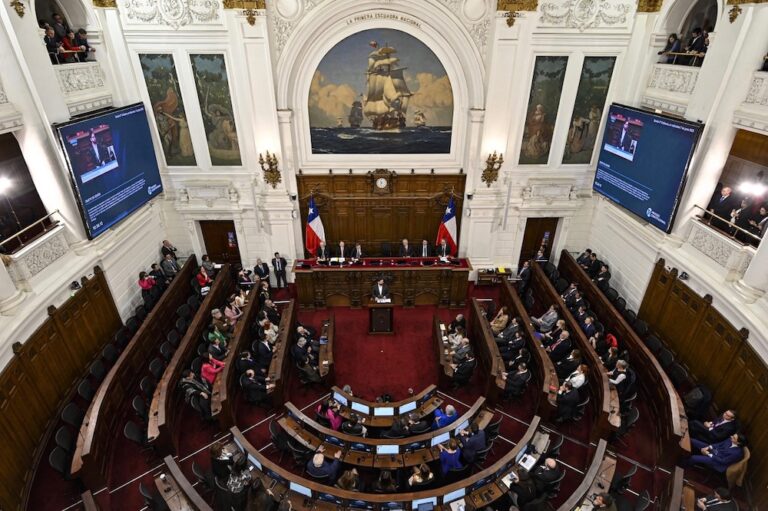(PERIODISTAS/IFEX) – On 2 May 2001, Appeals Court Judge Rubén Ballesteros closed the case on legal action initiated by the chief of staff of the Chilean Air Forces (Fuerza Aérea de Chile), General Hernán Gabrielli Rojas, against three former members of the United Popular Action Movement (Movimiento de Accion Popular Unitaria, MAPU), for having indicated […]
(PERIODISTAS/IFEX) – On 2 May 2001, Appeals Court Judge Rubén Ballesteros closed the case on legal action initiated by the chief of staff of the Chilean Air Forces (Fuerza Aérea de Chile), General Hernán Gabrielli Rojas, against three former members of the United Popular Action Movement (Movimiento de Accion Popular Unitaria, MAPU), for having indicated his participation in human rights violations during Augusto Pinochet’s dictatorship.
On Monday 12 February, Gabrielli presented his case against Carlos Bau, Héctor Vera and Juan Ruz for alleged violation of the State Security Law (Ley de Seguridad Interior del Estado, LSIE). The three citizens were victims of the former dictatorship’s repression and told Chilean dailies that Gabrielli was one of the officers who participated in the beatings and torture at the Cerro Moreno Air Force Base.
From the beginning, Gabrielli’s accusations were formally and fundamentally questioned. On the one hand, the LSIE is only applied whenever the victim is, among other high-ranking authorities, a commander-in-chief of the Armed Forces. The day on which the alleged slander was made Gabrielli had not yet assumed his temporary post as Air Force chief of staff, replacing official chief of staff General Patricio Ríos. Gabrielli claimed that since the testimonies appeared in the press days later, the crime was still relevant.
The second problem with the accusation is the recent repeal of LSIE Article 6(b), invoked by Gabrielli in the legal action taken. After this reform, judicial cases initiated using this provision might no longer be enforceable. Gabrielli, therefore, can resort to taking legal action against slander and insult using the criminal code.
However, preliminary reports indicate that Judge Rubén Ballesteros thinks the investigation has been exhausted and that there is nothing left to permit the prosecution of someone for having insulted or slandered Gabrielli. With this decision the judge left the case on the verge of complete closure.
Bau, Vera and Ruz’s defence counsel told the electronic daily “primeralinea.cl” that “during the trial it was clearly shown that there was no intent to insult but rather to denounce the severity of the situation of torture sessions in Cerro Moreno.” They also explained that, during the proceedings, it was proven that torture existed at the base and that Gabrielli was located there during the time the former members of MAPU spoke about.
From statements made by an airforce conscript and former lieutenant, “it was clear that they saw someone, who fit Gabrielli’s description, driving a prisoner from the casino to an area about 300 metres away, hitting and kicking him. The prisoner’s head was covered. Both military witnesses disclosed this information in a strictly discreet manner,” explained lawyer Hiram Villagra.
Even though Ballesteros’ ruling sets them free, Bau, Vera and Ruz would still like to use the case to attain a proceeding called “truthfulness” (“prueba de verdad”) o exeptio veritatis. This would allow them to reveal information that they possess about human rights violations at the Cerro Moreno base.


